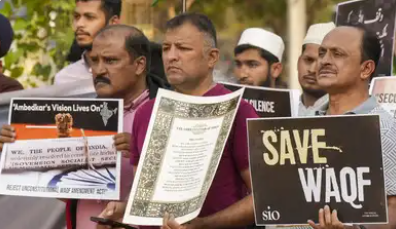– Mohammed Talha Siddi Bapa
New Delhi: The Government of India has formally notified the Unified Waqf Management Rules, 2025, triggering strong reactions from Muslim organisations and legal experts who accuse the Centre of bypassing democratic consultation and undermining judicial propriety.
The rules, published on July 3, pave the way for the implementation of the controversial Waqf (Amendment) Act, 2025, which has been legally challenged by both Muslim and non-Muslim organisations. The Supreme Court recently concluded hearings and has reserved its judgment on select petitions that were admitted for review. Despite this, the Centre has moved ahead with rule-making, a decision many see as premature and provocative.
The Core of the New Rules
The rules establish a centralised digital portal to register, audit, and monitor all waqf properties across the country. Mutawallis (managers of waqf estates) have been given six months to upload records of existing properties, including revenue details, income sources, legal deeds, and boundary maps. All newly declared waqf properties must be registered within 90 days.
The portal will be overseen by the Ministry of Minority Affairs, with a Joint Secretary designated as the central nodal officer. State governments have been instructed to appoint local officials to facilitate implementation.
The government asserts that the move is aimed at increasing transparency, curbing mismanagement, and bringing centuries-old Islamic endowments into the digital age.
Community Opposition and Legal Challenge
Major Muslim organisations, including the All India Muslim Personal Law Board (AIMPLB), Jamaat-e-Islami Hind, and several state waqf boards have voiced strong objections to the amended law and its rules. They argue that the changes undermine the autonomy of waqf institutions, violate constitutional protections of religious endowments, and enable the state to exert excessive control over Muslim charitable assets.
The AIMPLB, along with other concerned bodies, filed petitions in the Supreme Court challenging the constitutional validity of the Waqf (Amendment) Act. The Court has since admitted select petitions for review, completed hearings, and reserved its verdict – a signal that judicial scrutiny is actively underway, even as the executive proceeds with enforcement.
Critics see the rule notification as premature. “Some provisions…could be struck down by courts,” observed Prof. Faizan Mustafa, cautioning that advancing implementation while the Supreme Court deliberates risks undermining democratic checks and balances (The Wire).
Protests and Peaceful Mobilisation
Over the past two months, peaceful protests and awareness campaigns have been held across several states, including Karnataka, Maharashtra, and Tamil Nadu. Muslim groups have described the amendment as part of a wider trend of regulatory encroachment and the politicisation of minority affairs.
“What is at stake here is not just property – but trust, tradition, and constitutional morality,” said Dr. S.Q.R. Ilyas, spokesperson of the AIMPLB. “We are not against transparency, but we demand equity, consultation, and respect for judicial processes.”
Experts Question the Timing and Intent
Independent legal experts have also questioned the timing of the notification. “The government’s haste in notifying the rules, even as the matter is sub judice, suggests a willingness to sidestep the checks and balances of a constitutional democracy,” said Prof. Mustafa. “The optics are troubling, especially given the scale of community disquiet.”
Critics also highlight the practical challenges: many waqf boards in smaller states lack the technical infrastructure to digitise vast and often undocumented estates in the time allotted. There are also fears that once properties are on a centralised system, they could become more vulnerable to legal disputes or government interventions – particularly in states where land is already under contest.
Government’s Defence
“The portal – officially named the Central Waqf Management System (CWMS) – will bring transparency by publicly recording waqf properties, encroachments, financial data, and legal statuses on a centralised platform,” said a senior official from the Ministry of Minority Affairs, speaking on condition of anonymity. The CWMS is managed under Section 108B of the Waqf Act and overseen via the Ministry’s portal at centralwaqfcouncil.gov.in.
The government maintains that the rules do not interfere with religious practices and are in line with earlier efforts to streamline governance of public charitable trusts, regardless of religion.
The Road Ahead
With the Supreme Court verdict awaited and public mobilisation gaining ground, the fate of the Waqf (Amendment) Act and its rules remains uncertain. Several political analysts warn that the government’s unilateralism risks deepening the trust deficit between the state and India’s Muslim minority, especially at a time when religious polarisation is already high.
As the debate continues, all eyes are now on the judiciary – and whether it will uphold the concerns of India’s largest minority community or endorse the government’s push for administrative reform.




